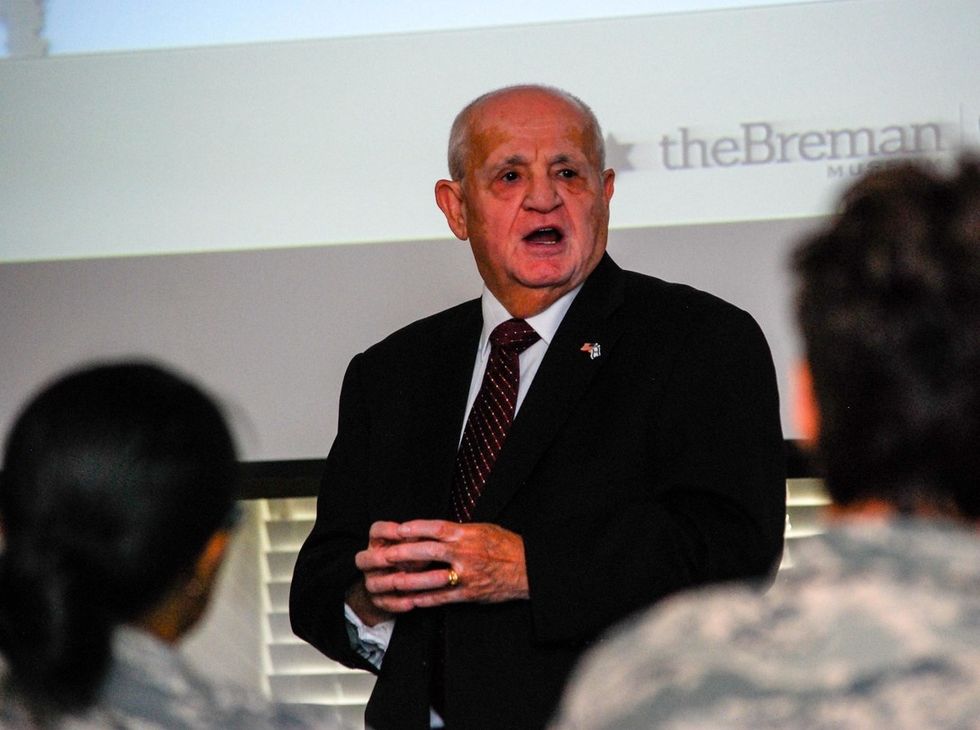On Monday, Feb. 11, a man by the name of Hershel Greenblat came to my school to talk about his life. The reason he came was to share his story with others. He started his lecture with this statement: "My name is Hershel Greenblat and I'm a Holocaust survivor."
I was hooked.
In the beginning, he told us that we all learn about the Holocaust at some point. We're given a bunch of numbers and names of major concentration camps, but what we are not given is the entire story, and he's right. We don't learn what happens to those who aren't in camps, we don't learn about those who actually made it out of the country, we don't learn about the ones who died trying to escape. We don't learn that Hitler tried three times to kill people before settling with concentration camps.
Hershel Greenblat's parents met in one of the many underground caves that were made to hide Jews, gypsies, homosexuals and others that were considered outcasts by the Germans. A year or so after their marriage, Hershel was born. They had to move from place to place to not get caught and because of this, Hershel spent the first 2 years of his life underground. That's a long time for little kid to go without seeing the world. When Hershel was a little older, he and his family with a couple of others went out to get some supplies and in the process, his mother got injured when a truck exploded. His father continued to risk his life to find food and supplies to survive in the cave with hundreds of other survivors and at one point, he got caught and went to prison. He was held until the war was over. His mother took care of him and his siblings despite being injured. At some point, Hershel became very ill, but even without any medication, he managed to survive. They eventually left the caves and moved east to avoid danger and then Hershel's first younger sister, Alta, was born. From the beginning, Hershel had a hard life and no person, child or adult, should have to go through this ever.
A few years later, the war is over. Hershel's family had nowhere to go because their homes were taken by Germans, so the family tries to escape with hundreds of others. They traveled through a train cart, hiding and only moving at night, until one day they were discovered, but not by Germans. The refugees were led to a hospital to get cleaned up and fed. The way I saw it was that for the families, it was a brief happy time and it brought tears to my eyes just thinking about it. It was the first time those people were treated like humans. They had arrived at a displaced persons (DP) camp in Austria. At this point in the story, I'm having a hard time imagining everything. There's so much sadness, pain and fear throughout his story and it's a lot to take in. There were even moments where Hershel sounded like he was about to cry and it punched me right in the heart.
After a year, his family was moved into a larger camp runned by the U.S. Army. It was here, that happy moments blossomed. Hershel's second younger sister, Ethel, was born. They were able to have proper baths for the first time. Children would run up to the gate and the Americans would throw Hershey chocolates to them, everyone would wave American flags and thank them, and the kids were allowed to go to school. But most of all, Hershel's family was allowed to move to America and that's where they began their new life. Hershel's father bought a store in a poor neighborhood where he began to help everyone in it. Hershel's baby brother, George, was born. Because of his teacher, Hershel was able to learn English and get the proper education and care needed. Hershel understood what it was like to live.
Today, he lives with his wife and has children, grandchildren and a great-grandson. They couldn't be living a happier life together and I couldn't be happier to be one of the people who had the opportunity to listen to his story and get the chance to share it. It was enlightening in a way that I can't even explain. I felt so emotional, but I was so happy that he was able to have the life that he deserves to have. The way he told his story with so much emotion was overwhelming and you could feel it throughout the room. At some point, every single student was listening to him because what he was saying was heartbreaking, but in the end, he got a happily ever after.
He told us three things at the end: one, respect your parents because they do so much more than you think for you. Two, respect your teachers. They will help you in any way they can and will be there when you need them to be. Third, respect yourself and others. We are all human beings.
The reason he told this story, and the reason I'm telling you, readers, is to keep the memory of his family and of the others that went through all of this alive, to make sure something like this never happens again, to make sure that we all realize that the Holocaust isn't just a bunch of numbers that we learn in school, but a time when people lost their family members, their dignity, their trust, their hopes and dreams. I have a huge amount of respect for those who went through all this torture and made it out alive and I will forever keep their stories with me and share and spread them.
For more information and to see where I got this information, click here.











